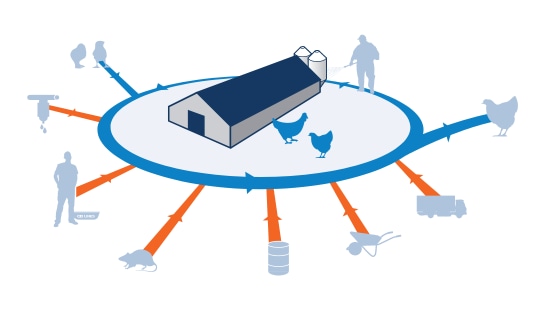
Farm Biosecurity
What is Biosecurity?
Biosecurity is a set of measures designed to reduce the risk of introduction, establishment and spread of pathogenic agents to, within and from an animal population. This includes restricted movement of animals, using quarantine and isolation units and cleaning and disinfection protocols.
Biosecurity has two main influences: 1) the balance among optimal production, food safety, animal welfare and One Health and 2) the presence of infections, the use of antimicrobials and the level of antimicrobial resistance.

Biosecurity and Antibiotics
Antimicrobial resistance poses one of the biggest threats to public and animal health.1 Of all antibiotics sold in the United States, approximately 80% are sold for use in animal agriculture.2
Although measures have been taken to reduce the non-judicious use of antimicrobials in livestock production, using these for non-therapeutic purposes remains prevalent in many regions across the world.
A well-known meta analysis reviewed 27 studies across multiple countries and showed that increased biosecurity measures were the biggest factor associated with lower levels of antimicrobial use.3

Biosecurity Project: Launch of Animal Production Academic Chair
The Animal Production Biosecurity Academic Chair is an industry/academic collaboration to further biosecurity training and research. Faculty of Ghent University Veterinary Medicine, Belgium, have collaborated with CID LINES, an Ecolab Company, to create the position. The initiative will focus on biosecurity measures that keep animals healthy, including One Health topics such as antimicrobial use.

Biosecurity in Animal Farms
Disease prevention is critical to keeping farm animals healthy and resilient, and it all begins with biosecurity.
External biosecurity prevents the introduction and spread of germs responsible for diseases coming into the farm; internal biosecurity controls existing diseases inside the farm. Ecolab has specialties within both areas.
A comprehensive biosecurity program will help you avoid low performance, animal mortality, treatment costs, antibiotics, labor inefficiencies, feed costs, lab tests and poor market acceptance. By reducing the introduction and spread of infectious diseases, you affect your production and your profit.
CID LINES, an Ecolab Company
Ecolab has strengthened our animal health offerings by acquiring CID LINES, a leading global provider of livestock biosecurity and hygiene solutions.
Disease Prevention
A farm biosecurity plan is essential for disease prevention. African Swine Fever, avian influenza and mastitis are particularly threatening to animals and farmers, and they have dire financial consequences. Find out the steps you can take to prevent these diseases from entering your farm and controlling them inside your farm.

African Swine Fever

Avian Influenza

Mastitis
Biosecurity Practices for Pig, Poultry and Dairy Farms
There are unique biosecurity practices for pig, poultry and dairy farms. And within each farm, there are specific needs by area. Barn hygiene, drinking water disinfection, transport cleaning and personal hygiene all require their own biosecurity measures.
Find out how you can support animal health while having positive impacts on your farm KPIs.

Pig Farm Solutions

Poultry Farm Solutions




